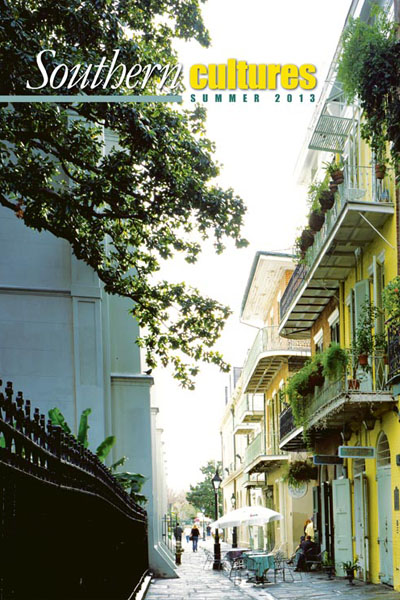Dr. Julius Hibbert: “Yes, I remember Bart’s birth well. You don’t forget a thing like . . . SIAMESE TWINS!”
Lisa Simpson: “I believe they prefer to be called ‘conjoined twins.’”
Dr. Hibbert: “And hillbillies prefer to be called ‘Sons of the Soil,’ but it ain’t gonna happen!”
—The Simpsons, season 8, “Treehouse of Horror”
In an interview a few years ago, I described my long-haired flannel-shirted lonesome undergraduate self as a “hillbilly doofus.”
Where did that come from? Not the second word, “doofus,” which was and is accurate, but the first: of all the words in the world I could have picked, why “hillbilly”?
I grew up in the Blue Ridge Mountains, the son of a Bill from the hills. I drove a local stretch of US 25, the Dixie Highway used by mountain families emigrating north to Detroit, to find work in the factories and live in the hillbilly ghettoes there.
And yet I never used the term “hillbilly” or gave it much thought. I never read Li’l Abner or Snuffy Smith on the comics page, I never ate Kellogg’s Frosted Sugar Stars (cereal mascot character: Hillbilly Goat), and I never saw a single episode of The Beverly Hillbillies or Hee Haw, because the nearby ridges kept our flimsy rooftop TV antenna from pulling in CBS shows.
I never ate Kellogg’s Frosted Sugar Stars (cereal mascot character: Hillbilly Goat), and I never saw a single episode of The Beverly Hillbillies or Hee Haw, because the nearby ridges kept our flimsy rooftop TV antenna from pulling in CBS shows.
But even on trips into savvy Asheville, the images were there—for example, on Tunnel Road, at the Mountaineer Inn Motor Lodge. It wasn’t the illiterate backwards Ns and Es on the tall sign that signaled “hillbilly”; it was the scraggly-bearded giant Mountaineer himself, looming over the motel and road. He wore patched overalls, a battered hat, and an ambiguous expression—threatening or welcoming, hard to tell. In one hand he cradled a corncob pipe; the other circled the barrel of an enormous shotgun resting on its butt near his big bare feet.
Surely my father and mother knew plenty of unstereotypical mountaineers, growing up in western North Carolina before the Depression. Their immediate families may have lived in town, in Asheville and Waynesville, but they still had plenty of country kin. All too familiar with that hardscrabble rural world, like other good postwar Americans they didn’t want to raise their kids that old way. They wanted a new and finer life for their daughter and son.
That must be why dad spent years converting our log house, built by a Floridian to be a summer vacation place for outsiders, into a comfortable year-round suburban home for us. That must be why mom loathed country music—originally called “hillbilly” music—and why our loud, trashy, Richard Petty–loving neighbors infuriated her. That must be why she went to such lengths praising any local manifestation of culture or elegance. “I’d scrub floors in the Biltmore House,” mom said, “just to be in such a place.”
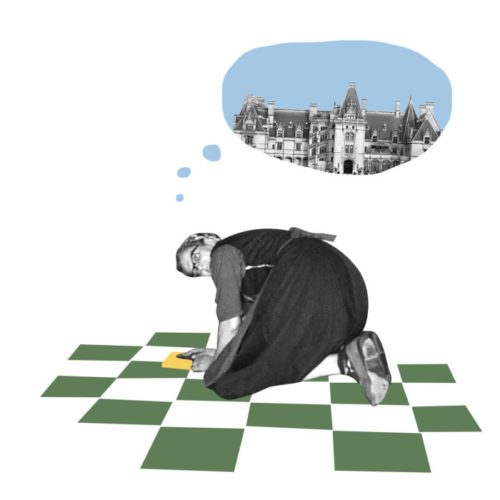
I’d scrub floors in the Biltmore House,” mom said, “just to be in such a place.
I love a juicy etymology, and you might think that “hillbilly” has one; but not really. The American Heritage Dictionary, first edition, on my writing desk for decades, says it comes from “hill + billy, pet form of William.” Whatever that means. The Dictionary of Smoky Mountain English says “origin obscure, attested only since 1900”—which makes it, ironically, a modern term. The Encyclopedia of Appalachia says it was first used in a New York newspaper to describe someone who “lives in the hills, has no means to speak of, dresses as he can, talks as he pleases, drinks whiskey when he gets it, and fires off his revolver as the fancy takes him.”
So the noun “hillbilly” may have been invented by a twentieth-century Yankee, who planted the seed of idle uncouth regional stereotypes in his original description. Did that doom the word from the very start?
I knew a real hillbilly kid when I saw one. Boys and girls alike looked different, smelled different, and acted different from the rest of us: pale, grimy, silent, peripheral. If they did show up at school, they didn’t pretend to like it.
I remember a tall third-grader named Pearl with scraggly white-blonde hair, who wore brogans and a threadbare floral granny dress and a thin tattered sweater always buttoned up. Who knows how many times she’d flunked already, looming above her new classmates like an uneroded peak? Her neutral gaze and expression never changed, not even the day the teacher caught her cheating, copying another girl’s test word for word, including the other girl’s name.

I was on the square dance team in high school, and I loved it. At the time, I didn’t think, “This is an expression of my mountain heritage, and much more authentic than any made-in-Asia hillbilliana art or craft.” What I did think was: All the really cute girls are on the team, and this is my best chance to touch and clutch and spin these beauties, in public!
We were pretty good, the T. C. Roberson team, and we traveled around the hills for exhibitions and competitions, including the Mountain Dance and Folk Festival, hosted by the ancient of days himself, the legendary Bascom Lamar Lunsford, who’d founded the festival back in 1928 and spent his long life collecting Appalachian songs. But we “smooth-style” dancers were mere shuffling posers compared to the clog teams and solo buck dancers, whose pounding rhythmical footwork shook the stages so hard you could literally see the boards move and the dust fly. Though no less patterned than our genteel routines, their loud powerful stompings and bouncings seemed much wilder, scarier, almost primitive. And while their legs were flailing, their upper bodies remained still, and their faces were always impassive: whatever true hillbillyness is, I was watching and hearing and feeling it anytime they danced.
That’s the sound that now means home to me, a music of nimble hands over strings: it’s all edge and pitch and headlong heartfelt bittersweetness, like I’m driving fast on a narrow mountainside road with no guardrail.
It was on those stages that I started paying attention to the music itself, the songs deftly picked and fiddled by local groups, some of whom were genuine old-time players. Their beat carried us through our routines, but the exuberantly melancholic notes and tone struck much deeper. That’s the sound that now means home to me, a music of nimble hands over strings: it’s all edge and pitch and headlong heartfelt bittersweetness, like I’m driving fast on a narrow mountainside road with no guardrail.
Shortly after we turned forty, my wife signed us up for a ballroom dancing class in Durham, where we live—a wonderfully romantic idea. I think we were the only straight couple, and I know we were the worst, all because of me. She learned the steps and turns perfectly from the first lesson, but I never got the hang of it, mostly because I couldn’t stop thinking and moving like a mountain square dancer. I wanted to swing my partner, promenade, four-leaf clover, birdie in the cage, dive for the oyster, dive for the clam, open up them pearly gates…
I never felt less like urbane Fred Astaire and more like a hillbilly rube.
I never considered myself a “southerner” until I got to Chapel Hill, where there were courses in such things as Southern Literature and The American South, where the level of regional self-consciousness was very high, and where there were more Yankees in one place than I’d ever encountered, not all of whom took kindly to the peculiar region where they’d landed.
I’d never really considered myself a “mountaineer” either, until I got to UNC and discovered books by Robert Morgan and Fred Chappell and Jonathan Williams on the library shelves, natives of Appalachia who wrote excellent poetry about its landscape and people and culture: they opened a new literary world to me, one that I hadn’t considered as a subject.
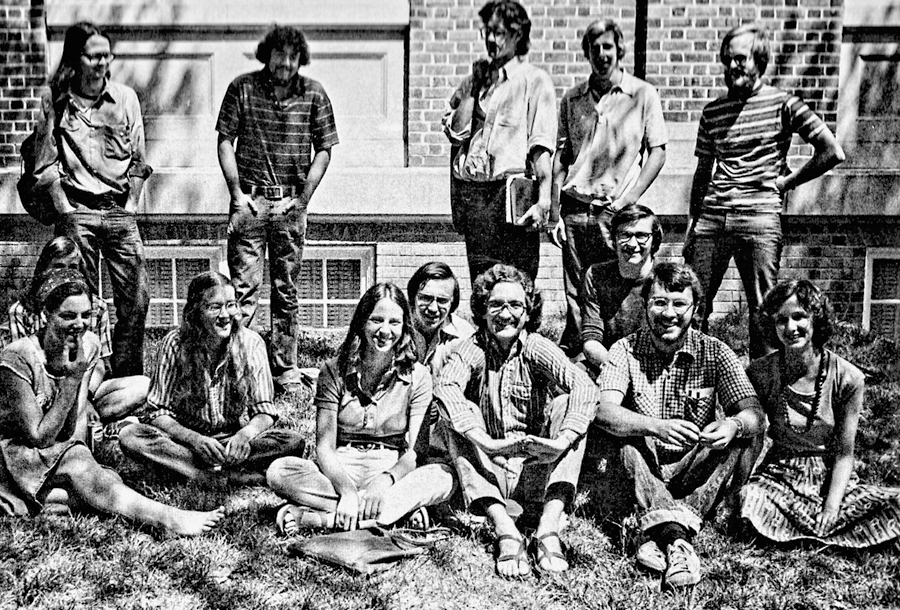
Recently, I dusted off the Yackety Yack yearbook from 1976, when I was a senior, and turned to the photograph of the staff of the Cellar Door literary magazine. Sitting on the dappled grass are the fiction and poetry hotshots, the clever writers and critics, the big scholarship winners and the cosmopolitan out-of-state students; standing behind them and to the side, almost out of the picture, is me—like the hillbilly kids at my elementary school, I was pale (genes don’t lie), grimy (wearing my one work shirt and one patched pair of jeans), silent (mouth closed), and peripheral (at the outer limits of the group). I look like what I was, a self-conscious mountain boy who knew his place.
And yet I’m smiling, at home at the margin, where all writers like to be.
Are hillbillies just hicks (the other h-word) at a higher elevation?
There’s no shortage of terms for “inhabitants of a rural or remote area who are characterized by an utter lack of sophistication or cultivation”—bumpkins, clod-hoppers, crackers, hinterlanders, provincials, ridge runners, rubes, sons of the soil, stump jumpers, yokels, and many others. Once you start looking and listening, the word “hillbilly” seems to be everywhere: in commercials, in The Simpsons, even in a recent New York Times crossword puzzle where 14-down was “Hillbillies’ cousins”—8 letters, starts with an R . . . of course, “REDNECKS.” I’m sure there must be shades of meaning for these hayseed terms, but when lumped together they sound like variations on the same derogatory theme.
At the Millennial Gathering of the Writers of the New South (Vanderbilt, 2000), I saw a writer weep over the use of the term “white trash”—she found it hurtful enough to make her cry, several times, in public and on camera. And Appalachian Journal, up at ASU in Boone, has a spirited and often angry feature leading off each issue, called “Signs of the Times,” where they document popular-media examples of the “cultural denigration” of Appalachia, especially images of the “contemptible rural unwashed.” Should I be more like them, vigilant and distressed about the careless or deliberate use of the word “hillbilly”?
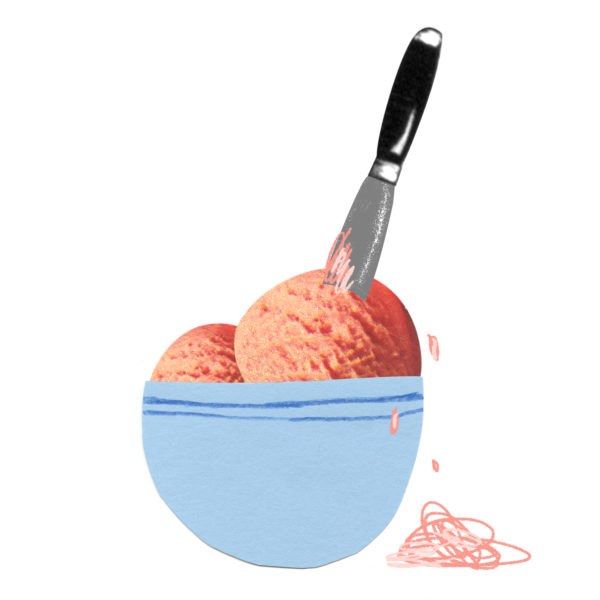
Once, an alert New York copy editor asked if perhaps I meant to use the word “spigot” at the end of the line “Mom held the long knife under the spicket”—tempering the blade with hot water before slicing some very frozen ice cream. I stood my ground and said, No, stet please, because that’s the word the characters in the poem would have used. To its credit, the magazine said, Fine, and the poem appeared in the fall 1996 issue of Hudson Review with the common Applachian word for an outlet of running water, the more colloquial “spicket,” intact—a small triumph for regionalism, right?
Not for long. I just checked that poem, “Yule Log,” in my book Earthly (2001), and discovered that Carnegie Mellon University Press, of Pittsburgh, Pennsylvania, changed the terminal word of line 14 back to “spigot,” without asking me and without me noticing it until now, nearly a decade later. It’s no big deal, it’s just a few letters, the Press was following standard usage and correcting a questionable spelling; but the tone is all wrong. The word that will outlive me, in the finished volume, is more like one that George Vanderbilt and his fellow aristocrats would have uttered at Biltmore Estate in the late nineteenth century than one that my poor hillbilly kin would have said ten miles south and many hungry years later.
Am I finally coming to terms with my inner hillbilly?
At the bucolic hilltop Virginia Center for the Creative Arts, several Aprils ago, two new writer-friends from New York and California called me a “hillbilly metro-sexual.” I laughed at the metrosexual part—nothing could be less likely—and at the oxymoron, which sounds like something that today’s hipster Asheville might put on a bumper sticker.
I held my tongue about “hillbilly.” Though I’d surely have corrected any mispronunciation of “AppaLAYchia,” I said nothing about that part of their wisecrack. I didn’t want to be rude to these beautiful visitors to the southern mountains, my native region, or to explain the vexed history of that word. But did I also keep quiet because I know I’m not really a hillbilly, any more than I’m a metrosexual?
Or is it actually the opposite—that, despite my suburban upbringing and decades in Piedmont academia, I knew the word was true to what I really am, at some essential level? Am I finally coming to terms with my inner hillbilly?
There’s no single “Appalachian accent,” any more than there’s a uniform “southern accent”—it all depends on where you’re from and who you grew up with and what stuck in your mouth and ear and brain. But at least in my corner of the North Carolina mountains, most of us articulated consonants and vowels, syllables and words, phrases and sentences in a certain way: both stretched-out and pinched-down, our speech could sing like a branch over rocks, but it never lost its chill, its shadows, its edge.
That accent is difficult to describe or to metaphorize. I know it when I hear it, and I used to speak in it, not just when I was growing up but also when I went back home for a while or when I talked on the phone with mom or dad, my speech lapsing into those hillbilly patterns that no doubt amused or even horrified the Chapel Hill globetrotters who overheard me saying “ink pen,” “might could,” “plum crazy,” “wadn’t,” “yonder.” It would have displeased my high school literature teacher, too, an elegant woman who did her best to strain local impurities from our south Buncombe version of the Queen’s English. But my mountain family is pretty much gone, and my native dialect is too, though that tongue or tone can resurface to surprise me now and then. I wish that happened more often.
Can an outsider use the h-word without being offensive, any more than a white person can use the n-word?
Probably not.
Can “a person from a rural mountainous area, especially of the southeastern United States,” to quote my falling-apart American Heritage, use the word “hillbilly” without being ironic or disparaging or self-loathing?
Maybe not, given the century of demeaning images that have barnacled themselves to the hull of that polysyllable.
And yet, unlike the n-word—which sounds like what it is, a vicious degrading epithet that I can’t bring myself to write or say—“hillbilly” itself is a not-unattractive sound. It fills the mouth nicely. It’s got dactylic charm, and it sports two alveolar rhymes concluded by the upbeat “e” sound. It’s a playful sequence of phonemes, much easier to say when self-identifying than “I’m an Appalachian-American,” and much more colorful than “I’m from the mountains.” It’s fun to speak, a sober joke: “My name is Michael, and I’m a hillbilly.”
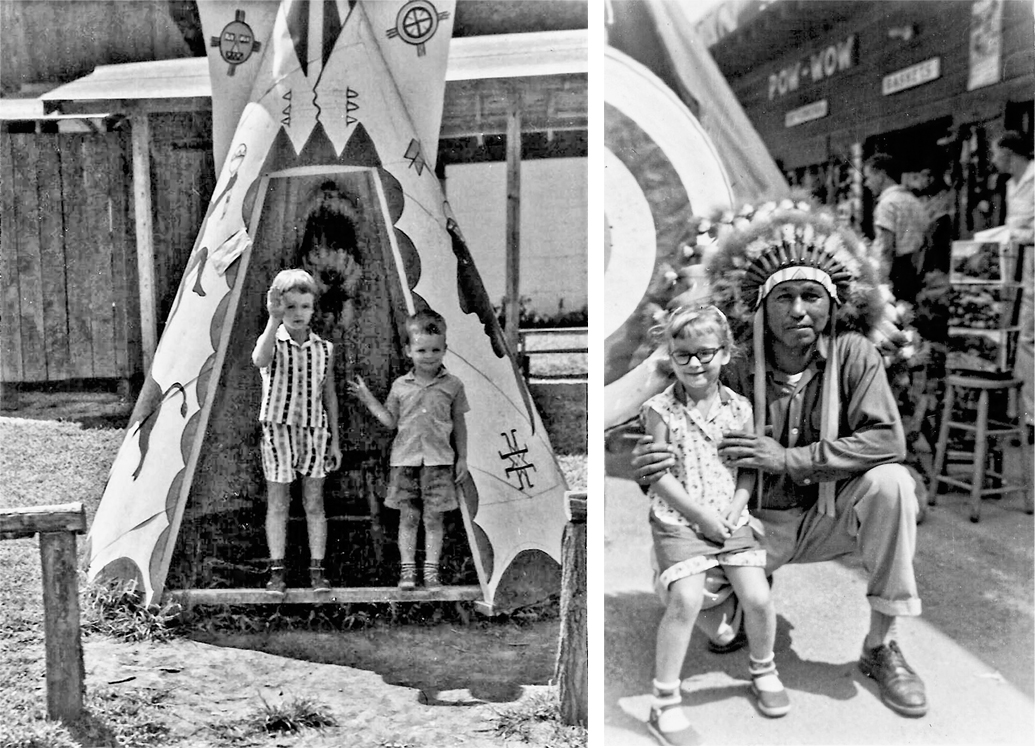
My name is Michael, and I’m a hillbilly.
Last week I found an envelope with some old black and white snapshots from half a century ago, from several trips our family made to Cherokee, N.C., nearly three slow hours to the west of our house in Arden—a place originally named “Shufordsville,” after all the local Shuford hillbillies, but later upscaled to the classier Shakespearean “Arden,” after the forest in As You Like It. In one picture, my sister and I wave from an overdecorated teepee’s open “door.” In another, I pose by a gift shop’s totem pole, trying to make a face fierce as the creatures stacked beside me. And in the last one, my sister sits on the knee of a squatting man, a photo so heartbreaking it’s hard to look at—because in this picture she’s still alive, a grinning little girl wearing her cat-eye glasses; because the gift shop behind them, whose sign reads “Pow-Wow,” is crowded with customers and junky souvenirs, including corny hillbilly postcards; but mostly because of the Cherokee man himself. He’s dressed in the same kind of shirt, slacks, and shoes that any American male might have worn in August 1956, but he’s also wearing a huge feathered headdress that must have been cruelly hot and heavy in the summer. No doubt he wore it because it’s what the tourists expected, because he had to make a living and support his family, and because it’s what “redskins” did back then: wear feathers, and say “how,” and pose for pictures with the white tourists whose ancestors drove their ancestors down the Trail of Tears . . .
His big hands carefully hold my sister. The sun further darkens his beautiful skin. He looks straight into the camera, his closed mouth hinting at the beginning of a smile.
Are mountaineers to “hillbillies” as Cherokees are to “injuns”?
No. Of course not. Native Americans have suffered in ways we can never imagine, and to a great degree because of us, the emigrant Scots-Irish who poured down the Great Wagon Road and eventually displaced them.
And yet—in terms of the nation’s popular culture, its versions and distortions of a people, its appetite for caricature—our fates are similar, if not equal. We’ve played the part if it paid and we needed to, in order to survive.
“Hillbilly” could be a fightin’ word, if delivered in the right (that is, the wrong) way, or if combined with the right (that is, the wrong) word: “stupid hillbilly,” “hillbilly idiot,” or any of a wide range of profanities used before or after it. If the right (that is, the wrong) person sneered at me and said, “You hillbilly moron,” I’d be tempted to toss my beer in his face and take a poke.
But as a lapsed quasi-hillbilly of upper-middle age who wears expensive bifocals, I wouldn’t. I’d probably try to turn his insult into harmless self-deprecation, a few laughs, something to snuff out the punches before they start. Isn’t that another way to survive?
I’ve lived in the Triangle area of North Carolina for nearly forty years, but I’ve yet to stop yearning for the mountains. Other immigrants from the hills say the same thing: the Piedmont is a terrific place to live and work, but it simply doesn’t feel like home, deep down.
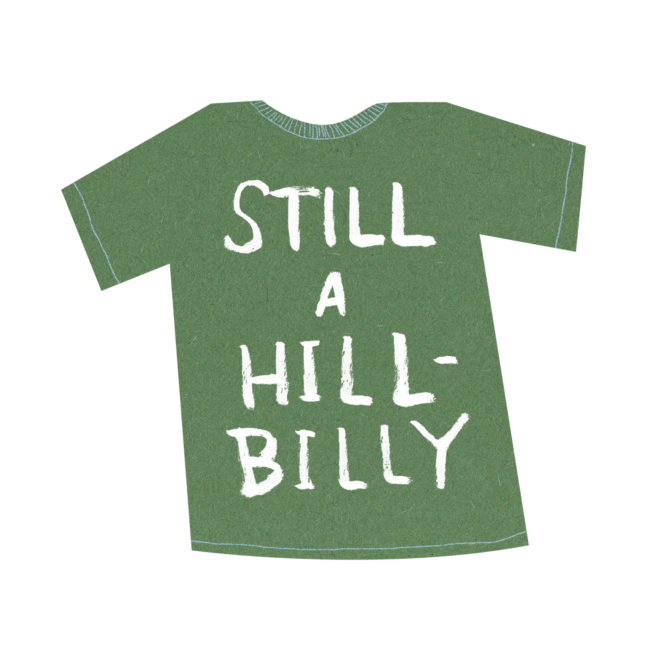
Maybe somebody should make T-shirts for us Appalachians-in-Exile, with the motto, STILL A HILLBILLY. I’d mean the last word, “hillbilly,” not as caricature but as a suggestion of character: independent, peculiar, spirited, inventive, and very proud of where and what and who I came from. I’d mean the first word, “still,” not as a moonshine pun extending the internal rhymes, but as a testimony to the power of place: I wasn’t trapped by the hills, I got out, I made a good life elsewhere, but part of me will always be of the mountains, if not in them.
I know there’s a clear distinction between the terms “mountaineer” and “hillbilly.” The former is more accurate and positive, or at least neutrally descriptive; the latter is exaggerated, negative, even offensive in its cartoonish image of a poor dumb lazy feller who only rouses himself from nappin’ or tendin’ the still to go huntin’ with his hound or flirtin’ with his gal or feudin’ with his gol-dern neighbers.
But I’m a poet, and—despite the ludicrous stereotypes—I can’t help liking the word itself and what it does. “Hillbilly” conjures up more of an image than “mountaineer,” just as the word “cabin” makes a clearer picture and sharper sound than the phrase “vernacular log architecture.” And whether used as noun or adjective, it’s geography-specific, always (in my opinion) a strength, its syllables like blue hills receding toward the horizon.
I guess I’m looking for the virtues in “hillbilly,” the positives in the negative. Can this term be redeemed, reclaimed, used? Is it disingenuous, here in the hyper-wired twenty-first century, to adopt it as one’s own?
Can this term be redeemed, reclaimed, used? Is it disingenuous, here in the hyper-wired twenty-first century, to adopt it as one’s own?
Sometimes, after I make an especially dark pronouncement or gloomy prediction, I’ll shrug and say, “Well, I’m just a hillbilly fatalist.” I inherited that philosophical predisposition from my mother, who could find the coal-black lining in any silver cloud. She believed, and a lifetime of disappointing experience had proved, that fate was waiting for you at every turn, ready to crush your spirits and prospects flatter than a fritter: you might as well accept and submit to it.
But mom was a paradox. Despite her bleak fatalism, falling like a shivery mountain shadow over anything we mortals might try to do, she was hardly a passive woman: clever, tenacious, ambitious for us kids if not for herself, she never gave up. Despite the chip on her shoulder typical of many Appalachian natives—a sense of inferiority to the more educated citizens of the outside world, a persistent and unshakable insecurity—she never backed down. Even if the situation was ultimately hopeless, she refused to surrender. Her specialty was feisty letters to the editor about local injustices and indignities, at least as she perceived them, including the 1960s chlorination of the water supply.
In a way, she was the quintessential hillbilly, ignored or condescended-to or put-upon all her life, yet willing to take a stand and fight, even if her efforts seemed foolish or doomed. To use a term she applied to other people she admired, folks whose complicated personalities could accommodate considerable tension and contradiction: my mother was “a real character.”
I don’t really think about my inner hillbilly all that much. Some things will stir it up, though, and bring that private identity suddenly to the surface: a beautiful picture of the Blue Ridge ranges, say, or a few notes of that high lonesome blue-grass sound, or the slightly acrid and loamy smell of a rhododendron thicket.
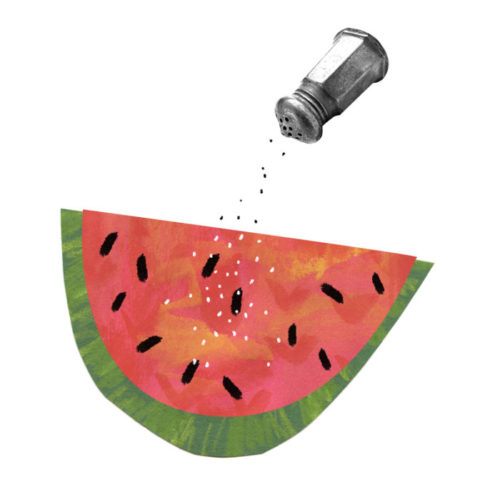
Or—lately—food. I’ve been thinking about, even craving, some of the stuff we ate when I was growing up, which has led me to write about such fare as sawmill gravy, salted watermelons, and even the humble cracker, the basic white Premium saltine by Nabisco:
“Saltine”
How well its square
fit my palm, my mouth,
a toasty wafer slipped
onto the sick tongue
or into chicken soup, each crisp saltine a tile
pierced with 13 holes
in balanced rows,
its edges perforated
like a postage stamp,one of a shifting stack
sealed in wax paper
whose noisy opening
always signaled snack,
peanut butter or cheesethick inside Premiums,
the closest we ever got
to serving hors d’oeuvres:
the redneck’s hardtack,
the cracker’s cracker.
I may not have used the word “hillbilly” at the end of that poem—it didn’t sound as good as the others, and didn’t deliver the punch line—but believe me, that’s the group I had in mind.
I know I need to be careful about my diet, and not eat too much salt or sugar or bleached flour, and avoid too many additives. Having lived where I’ve lived and done what I’ve done for so long, I know how to enjoy a pricey cracker with fancy toppings. I have shopped at A Southern Season, “Chapel Hill’s Landmark Gourmet Market,” without embarrassing myself or my companions. But a saltine feeds a hidden part of me in a way that nothing else can or ever will. It connects me to my childhood, and to my family, and to my family’s family. It’s beyond comfort food: it’s communion.
I’m not sure why I used the word “hillbilly” in that interview. It was unpremeditated tomfoolery. Maybe I was unconsciously echoing the Seinfeld episode where Jerry calls Kramer a “hipster doofus,” and substituted one h-word for another. Or maybe I was just goofing around with words, as usual, and liked the way “hillbilly” sounded with “doofus.”
And yet—without stopping to think or censor—“hillbilly” was in fact the word that came to my mouth, to characterize myself as an outsider among the sophisticates at UNC, way back when. I wasn’t the first mountaineer to feel that way; another who did was Thomas Wolfe, fellow native of Asheville and Buncombe. Though Tom thought of himself as a city boy—unlike the “mountain grills” that his father railed against, those lazy and swinish rustics outside town—he was regarded as a kind of wild hillbilly giant here in Chapel Hill. Hundreds of miles from “the hills that shut in Altamont,” as he calls them in the first sentence of Look Homeward, Angel, Wolfe discovered his Appalachian subject matter and self-identity while starting out as a writer in college, back in 1916. His later description of the native population around Asheville, at the turn of the twentieth century, is an insightful appreciation of hillbillies: “The hill and country people in the surrounding districts,” he writes, “were Scotch-Irish mountaineers, rugged, provincial, intelligent, and industrious.” I love how he uses the word “provincial” in a positive way, as a strength and not a limitation. Tough, rooted in their place, quick-witted, hardworking—that’s the true hillbilly at his best, and the one I aspire to be, wherever I am.
I admit: I don’t look or behave any more like one of those rugged “Scotch-Irish mountaineers” than Thomas Wolfe himself did. And yet both of us Buncombe County boys harbored an inner hillbilly, something that (much to our surprise) endured and deepened through long years away from Appalachia. Even if neither of us displaced natives could ever go home again, home never quite left us, and we never stopped longing for the hills. We kept going back to the mountains the only way we could, finally: through words.
Michael McFee has taught in the Creative Writing Program at UNC-Chapel Hill since 1990. He is the author of eleven books of poetry, most recently We Were Once Here (Carnegie Mellon University Press, 2017). His sixteenth book and second collection of prose, Appointed Rounds, which contains two essays first published in Southern Cultures (“My Inner Hillbilly” and “Just As I Am Not”), is forthcoming from Mercer University Press.

